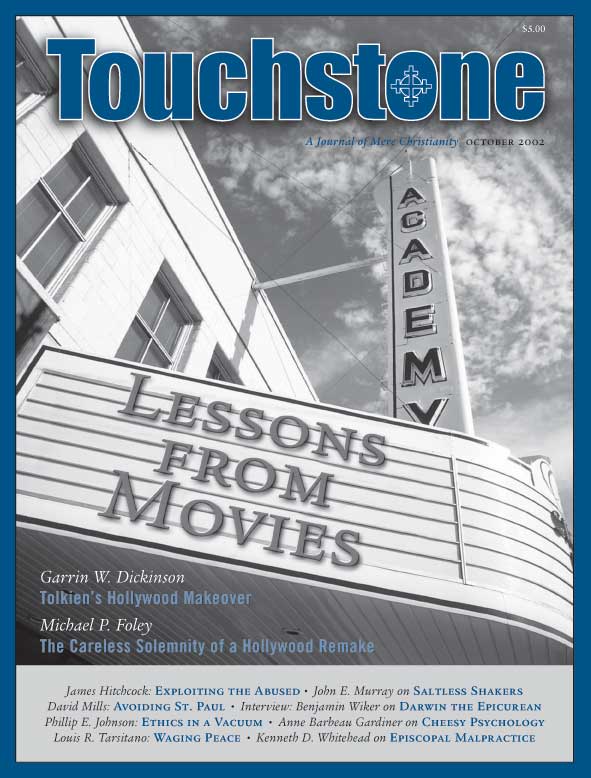Just Visiting Ourselves
Michael P. Foley on the Careless Solemnity of a Hollywood Remake
In general, and often regardless of their quality, cinematic remakes serve as testaments to the differences between two cultures or times. Viewed together, for example, the two productions of Father of the Bride set into sharp relief the different convictions about sex and gender equality that distinguish the 1980s from the 1950s. Remakes have a barometric quality about them, disclosing in their additions or subtractions the underlying assumptions of their creators.
An excellent case in point is a bawdy comedy named Just Visiting (2001). This Hollywood reproduction of the 1993 French blockbuster Les Visiteurs reveals much about the popular American perception of Christianity—and about our culture’s growing solipsism.
The Original
The original Les Visiteurs (which grossed more than any other French comedy in history) is the story of two medieval Franks—a valiant count named Godefroy and his scurrilous serf Jacquouille—who wind up in the year 1992. In one of the first scenes after the credits, Godefroy captures a witch for her practice of the black arts. Unfortunately, the witch is able to take her revenge by drugging him, under the spell of which he kills the father of his betrothed.
Ruined and disgraced, the knight seeks the aid of the family wizard, who concocts a potion to send him back through time to undo the damage. But the aged sorcerer forgets an ingredient, the quails’ eggs, and so both nobleman and churl are inadvertently hurled forward into the future.
What ensues is the kind of mayhem one would expect from such a fish-out-of-water premise. Although the knight is able to find his great-great-great-great-great-granddaughter, he remains lost in a world of automobiles, electric lights, and telephones. The ensuing destruction of modern appliances and misuse of indoor plumbing is the stuff of good, if vulgar, humor. So too are the other characters’ reactions to medieval political incorrectness, as when Godefroy sings of disemboweling an English enemy or when he and his serf—whose eructation, flatulence, and lack of hygiene give the film its ribald texture—dine like philistines.
Count Godefroy is, in short, larger than life. His appetite is enormous, as is his capacity for courtly love. His virtues (such as courage) are genuine, and his chivalry unwavering. And he is unimpressed by modern times. On a couple of occasions the knight sniffs and says that “the air stinketh,” and once, after surveying the concrete world around him, asks with disdain, “Where is nature?”
But what is perhaps most remarkable about this French yarn of foul mouths and belly laughs is the unassuming accuracy with which it portrays the faith of medieval man. In a sense the plot hinges on the Catholic piety of the knight: His capture of the witch is motivated not by any threat to him or his subjects, but by revulsion at her ungodly profession.
When Godefroy and Jacquouille realize that they are in the future, it is the count who leads the peasant in an eloquent recital of the Our Father in Latin as they kneel solemnly in prayer. (Significantly, his descendant’s husband, who is frequently the butt of the joke, balks when he sees this.) And when the count becomes overwhelmed by the sights and sounds of the modern city, he runs into a church, dives for the altar linen, and yells “Sanctuary!”—much to the dismay of the priest offering Mass.
Even the serf, who is hardly zealous in his practice of the Christian virtues (so little so that he has no problem stealing the jewels off a dead man in church and hiding his booty in the sacristy), has faith in the biblical worldview. It is he who vehemently objects to what he thinks is the wizard’s plan to resurrect his master’s would-be father-in-law, on the grounds that only God can do this. And it is he who, when he sees the condition of Godefroy’s chapel in the twentieth century, poignantly bewails its dilapidation.
The Remake
Though it retains most of the same gags and plot, the American version, on the other hand, is a different tale. Just Visiting likewise opens in the Middle Ages, but this time with a voice-over by Kelsey Grammar that cartoons the knight’s heroism. The agent of his calamity is again the witch, but now she is merely the hireling of a rival suitor. We are thus never shown the knight’s pious wrath.
Another alteration to the script, the knight’s mistaken slaying of his beloved rather than her father, initiates a significantly different conversation with the wizard. In the original, the wizard agrees with Jacquouille that God is the sole author of life and thus recommends time-travel as a valid alternative. In the remake, however, when the knight asks if his fiancé can be brought back to life, the smiling Merlin replies that he can indeed “reanimate the corpse,” but that her smell would not be pleasant. As he later demonstrates, this is no empty boast: After a chemical explosion literally blows him to pieces, the wizard raises himself from the dead.
Sorcery thus makes a greater claim to preternatural power in the American film, while the other contestant, Christianity, is relegated to the field of the feckless. When the ancient pair wake up in the year 2000 in a Chicago museum (don’t ask), they immediately conclude—being the victims of Catholic guilt that they undoubtedly are—that they have been condemned to hell. As in the first movie, they fall to their knees in prayer, but instead of reciting the Pater Noster, all they are now able to sputter out is, “O God, we are really, really sorry.” The knight’s faith is no longer a constitutive part of his nobility, and when it does appear, it is on the wrong end of the joke.
The effect of this is that both medievals come across as superstitious rubes rather than dauntless, if misguided, voyagers. For example, in the first movie, they demolish a car thinking it to be a horseless chariot driven by a Saracen foe; in the second, they wreck an SUV because it is “a red dragon.” The change may seem trivial until we advert to the assumptions operative in each. The original depicts the medieval mind responding rationally, albeit mistakenly, to a hitherto unknown technology. The same scene in Just Visiting depicts a mind so warped by the narcotic of religious myth that when confronted with chrome and steel, it can only make out the scales of a fire-breathing monster.
While the remake may use wizardry to highlight Christianity’s presumed impotence, it does not, however, consider the occult (the scenes of which always contain a wink at the audience) a viable candidate for our highest allegiance. To learn what the American film does venerate sincerely, we must turn to its revisions concerning the serf.
In the original, Jacquouille is pure libido. He lustily hooks up with a trashy vagrant whom he calls his “ripe apple” and with whom he plays the parvenu prodigal. The knight cannot wait to return home, but the peasant prefers our time to his, essentially because of its license. Our culture of instant gratification suits his uncultivated appetites: His plebeian greed is merely a scruffier version of our bourgeois morality.
But in the American remake, the emancipation of the serf is treated with humorless hauteur. The stage is first set by a display of his valor (a quality noticeably absent before) as he defends an endearing girl-next-door character from her browbeating boss. Next we feel sorry for the humble servant when the count nonchalantly tells him, “You are my property, but you have no value.” (The producers may want to double-check the definitions of serfdom and slavery.) This outrageous remark is designed to make us root for the little peasant’s freedom, and so we do not blink when his new girlfriend (the blonde from next door) opens her own consciousness-raising workshop, teaching him to say over and over, “I am a free man.”
In the climax to this American subplot, when the count is confronted with the newfangled aspirations of his valet, the great-granddaughter pleads on his behalf: “He only wants what we all want. . . . It’s the noble thing to do.” And what does the serf want? “To wear exciting men’s fashions at rock-bottom prices,” he proclaims, and “to be nice and cool.”
Jacquouille, however, is not the only character to undergo a radical makeover: Just Visiting presents an equally metamorphosed great-granddaughter. In the original, Count Godefroy’s distant descendant is a harried but well-balanced mother trying to make sense of what she believes is her insane cousin and his strange friend. That confusion exists in the remake as well, but now the woman (named Lady Julia and played surprisingly well by Christina Applegate) is single and in the process of being conned by her unfaithful fiancée.
What is more, we learn that Lady Julia is harboring a terrible secret: She is suffering from that most heinous of maladies, low self-esteem. Her boyfriend calls her “bunny,” and this has enforced her self-image as timid and dependent. Fortunately for Julia, her hoary ancestor is there to empower her by teaching her, in a single lesson, how to wield a sword. The production notes tout the scene as a “metaphor for her strength.” It is quite a metaphor, especially from a Freudian perspective, as is the climactic confrontation in which Lady Julia, realizing that she has the heart of a lion instead of a bunny, takes the count’s sheathed sword as he stands idly by and delivers a blow to her two-timing paramour’s groin.
Trivializing Freedom
Of course, all is fair game in comedy, but these are the parts of the movie we are supposed to be taking seriously. The peasant’s character, we are told by the production notes, “was expanded to explore new concepts such as liberty and equality,” while we learn from an interview with Ms. Applegate that she was attracted to the Lady Julia role because the character was about “falling in love with yourself” and being able to make a “declaration of independence . . . a declaration of self and spirit.”
And yet the ironic result of equating liberty with the right to be cool and of equating independence with falling in love with yourself is that it breeds cynicism rather than awe. As Chesterton once observed, “The thing which is fundamentally and really frivolous is not a careless joke. The thing which is fundamentally and really frivolous is a careless solemnity.” It is the remake’s careless solemnity that has the unintended effect of trivializing what it wants to revere.
Just Visiting, then, is ultimately more emblematic of the failures of the modern age than its triumphs. As the remake unwittingly demonstrates, when orthodox Christianity is replaced by a secular liberation from superstition and servility, we arrive not at enlightenment but at shallow commercialism, vacuous platitudes, and a silly dallying in the occult. To crib again from Chesterton, the problem of not believing in God is that we now believe in anything.
And there is an additional price to be paid for this cultural self-congratulation: the loss of an avenue into self-knowledge. The real problem with the American remake is that it cements viewers in their myopia. We are given a full dose of how we look at other eras, but we are never given an honest glimpse of how another era might look at us, which is always the great promise of films like these. When we peer through Just Visiting’s glass of time, we see at best a reflection of ourselves, at worst caricatures ready for derision.
Put differently, the American film’s cultural solipsism—by which I mean an incapacity to understand any times or thought other than one’s own—undermines the conditions for self-knowledge. Rudyard Kipling’s imperialist verse about the English and their vast colonies, “And what should they know of England who only England know?” works better when applied to the question of self-knowledge. Those who only know the self do not know themselves. As Just Visiting’s triumphalist spirit about its own secular idols amply attests, there is an inverse proportion between solipsism and self-knowing.
The French Les Visiteurs, by contrast, is not a profound movie (comedies try to avoid that adjective), but what it does do, perhaps even despite itself, is successfully juxtapose contemporary and medieval life. This, in turn, invites the audience to gain a certain critical distance from the prejudices and conventions it has always assumed to be true, a distance that may prove pivotal in gaining a deeper insight into previously unexamined assumptions.
My guess is that Les Visiteurs did not leave its French fans pining away for the knight’s age (nor should it have), but it may have left them a little less satisfied with their own. It is this kind of transcendent restlessness that good comedy is capable of producing, a restlessness that by leading us out of ourselves helps us to know ourselves.
The End
Perhaps it is the endings to the two films that most clearly illustrate their differences. In the French original, the peasant betrays his own kin to stay in the present, while the knight, having rejected modernity’s egalitarianism as incommensurate with his love of excellence, returns home.
The finale of the American version, on the other hand, shows the peasant and his girlfriend happily speeding along in a purple hotrod on a desert road. Suddenly, the serf’s face grows sullen. Now that he is free from his master, he asks, “Who is going to protect me from the devil?” (I bet you never knew that a clause in the feudal social contract concerned indemnity from the demonic.) His cute companion leans over reassuringly, turns up the Sonny and Cher song on the radio, and says, “Don’t worry: You’ve got me, babe.” After all, when you have self-esteem and a blond to boot, there is little more for which you are expected to ask.
Michael P. Foley is an associate professor of Patristics in the Great Texts Program at Baylor University and the author of The Politically Incorrect Guide to Christianity (Regnery, 2017).
subscription options
Order
Print/Online Subscription

Get six issues (one year) of Touchstone PLUS full online access including pdf downloads for only $39.95. That's only $3.34 per month!
Order
Online Only
Subscription

Get a one-year full-access subscription to the Touchstone online archives for only $19.95. That's only $1.66 per month!
bulk subscriptions
Order Touchstone subscriptions in bulk and save $10 per sub! Each subscription includes 6 issues of Touchstone plus full online access to touchstonemag.com—including archives, videos, and pdf downloads of recent issues for only $29.95 each! Great for churches or study groups.
Transactions will be processed on a secure server.
more from the online archives
calling all readers
Please Donate
"There are magazines worth reading but few worth saving . . . Touchstone is just such a magazine."
—Alice von Hildebrand
"Here we do not concede one square millimeter of territory to falsehood, folly, contemporary sentimentality, or fashion. We speak the truth, and let God be our judge. . . . Touchstone is the one committedly Christian conservative journal."
—Anthony Esolen, Touchstone senior editor









